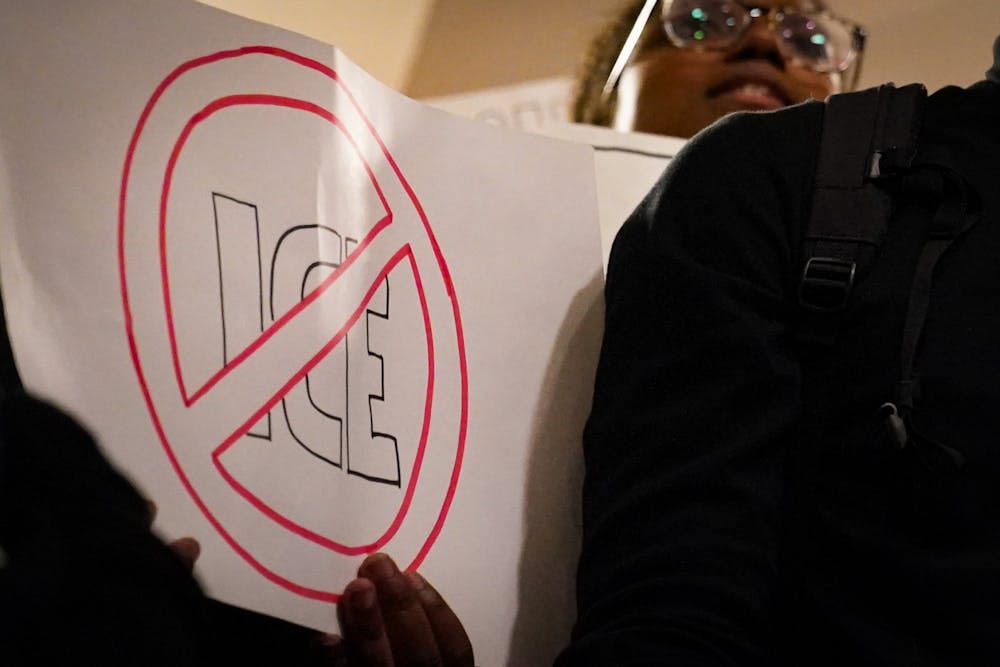International students feel wrongfully targeted by the United States government and are uncertain about the future of their education, following the release of new Immigrations and Customs Enforcement guidelines declared Monday.
ICE is mandating that international students are to be banned from entering or staying in the U.S. if they are not taking any in-person courses during the fall 2020 semester. Penn has since condemned the order.
At universities adopting a hybrid model of instruction, like Penn, international students must continue their studies at least partially in-person to remain in the country, according to ICE’s Student and Exchange Visitor Program. Foreign students under F-1 or M-1 visas will be forced to leave the country if they are enrolled in only virtual courses and are already in the U.S.
Under this policy, students currently abroad in their home countries would be unable to enter the U.S. to take all online courses here in the fall.
International students — which accounted for about 21% of Penn's graduate and undergraduate student population as of fall 2019 — are now scrambling to confirm they are taking at least one in-person course this fall.
Rising Engineering junior Tony Zhu, who is from China, said he was dumbstruck when he read the news because he did not understand the policy’s purpose, which he believes promotes in-person learning, rather than discouraging it, increasing students' chances of contracting COVID-19.
Zhu said he feels like international students are being used as political pawns in President Donald Trump’s game as the new regulations force universities to offer in-person courses to protect their international students.
“We pay so much money just like everyone else in this country to colleges and I feel like we should be treated as equals, even though we're from another country,” rising College senior and Chair of International Students Advisory Board Derya Yavuz said. “I do feel like I'm not treated as equal right now.”
RELATED:
Penn condemns ICE order requiring intl. students to take in-person classes or leave U.S.
New visa restrictions won’t affect most Penn intl. students. Many still remain worried.
The over one million international students in the U.S. — 5.5% of the nation's higher education population — contributed nearly $44.7 billion to the country's economy in the 2018-2019 academic year, according to The Institute of International Education.
ICE's announcement comes at a time when nationwide universities are experiencing massive financial losses in response to the ongoing COVID-19 pandemic, anticipating potential declines in enrollment and consequential losses in tuition money. Penn has already reduced its budget for the 2021 fiscal year.
Rising College senior Wendy Qian said she initially planned to enroll in an online-only semester and take classes from her home country, Singapore, but she now feels pressured to take the fall semester off due to the growing uncertainties and because she does not feel safe flying back to the U.S. due to coronavirus-related health concerns.
Yavuz, who is from Turkey, said she hopes to return to campus this fall for her senior year. She is enrolled in one in-person fall course, meaning her stay in the U.S. will be up to the professor’s discretion.
International students enrolled in schools offering solely remote learning this fall may not stay in the U.S. unless they transfer to an academic institution offering in-person instruction, according to ICE's announcement.
At Penn, many schools such as the Nursing School have announced that they will offer a mix of virtual classes and in-person labs and clinicals. The Graduate School of Education will offer only virtual classes with some exceptions for clinical and executive programs. Students who remain in the U.S. despite an online-only course load will risk being deported, according to ICE.
Incoming GSE first-year April Zhou, who is from China, created a petition on Tuesday urging the dean of GSE to implement a hybrid instruction model for the school's fall courses, with the goal to add in-person courses for international students who need them to safely stay in the country. The GSE-specific petition currently has more than 325 signatures.
If GSE does not switch to a hybrid model, Zhou is considering transferring to Arizona State University, where she was also accepted to begin classes in the fall, since Arizona State is offering in-person courses.
“Am I risking my life to like get my degree? Because that's what it feels like,” Zhou said. “You either go home, or transfer to a school that offers in-person classes, but there is a very high chance of getting COVID-19.”
Even if Zhou continues her online-only studies from China, she is worried that she will be at a disadvantage since she will not have access to many websites under the Chinese government’s censorship rules. She does not know if she will be able to return to the U.S., where she is currently staying, if she must return to China in fear of losing her F-1 status — which she has held for the last 10 years.
As students search for pathways to remain in the country, Police Free Penn created a petition urging Penn to reject ICE's guidelines and protect its international students from deportation. The petition, which was started on July 7, has over 350 signatures.
Rising University of Rochester junior Lea Thome also created a nationwide petition urging ICE Student and Exchange Visitor Program to permit international students to remain in the U.S. while taking online-only classes. The letter also demands that international students be allowed to enroll in a full online-only course load from their home country, even if their university is following a hybrid model. Thome's petition currently has over 230,000 signatures.
ICE’s latest restrictions display the Trump administration’s continuous promotion of anti-foreigner policies under the pretext of coronavirus-related safety concerns, The New York Times reported.
“The environment that is created by the current presidency is not very friendly,” Zhu said. “We just want to complete the education but then we're used in this big, political game to get the votes.”
The new regulations have only raised the already-high hurdle foreign nationals must jump over to continue their American education — as international students are also facing global travel bans and visa complications, financial limitations, and concerns about contracting COVID-19.
Many international students who are currently in the states feel stranded between the U.S. and their home country as they try to map their next steps.
The stakes are especially high for rising College senior and Assembly of International Students President Justine de Jesus, who holds a Philippine passport but is currently living with her family in Singapore on an extended tourist visa.
De Jesus plans to return to the U.S. this month when her Singaporean visa will expire — but if her fall seminar professors decide to host classes in a strictly online format, she will be forced to leave the country within 10 days.
If an international student’s fall schedule changes to an all-virtual format, regardless of reason, the student will have 10 days — starting when the course load becomes only-online — to leave the U.S., according to ICE’s announcement.
Although de Jesus said she is hesitant to return to the U.S. under ICE’s new guidelines, she said she does not have anywhere else to go.
Due to Singapore’s current travel restrictions prohibiting short-term visitors from anywhere in the world, she will not be able to return to Singapore, where her family currently lives, once she arrives in the U.S. Instead, if de Jesus must leave the U.S., she will have to fly to the Philippines where she does not have anywhere to stay.
China’s limited flight options and high price point of international flight tickets are a reflection of China’s unwillingness to welcome back Chinese citizens from the states, Zhou said. She added that she knows students in the U.S. who have been waiting for over two months to get a spot on a plane back to China.
Rising Engineering junior Varun Sajal Jana, who is currently in the U.S., like Zhou, said that in order to return to his home country of India he must book his seat on a government-sponsored flight at least one month in advance. If Penn switches to an online-only model after the fall semester begins, he worries that he may risk being deported as it is unlikely he would be able to book a plane ticket within the allotted 10 days given to nonimmigrant F-1 students under the new restrictions.
As the University rushes to safeguard its international students while keeping the Penn population safe amid the coronavirus pandemic, it is still figuring out how it can best support its international students.
“I think the University is in a very sticky situation,” Qian said. “Either model will hurt certain groups of students.”
A previous version of the article stated that the Graduate School of Education will only offer virtual classes while, in fact, it will allow for some exceptions for clinical and executive programs. The DP regrets the error.









